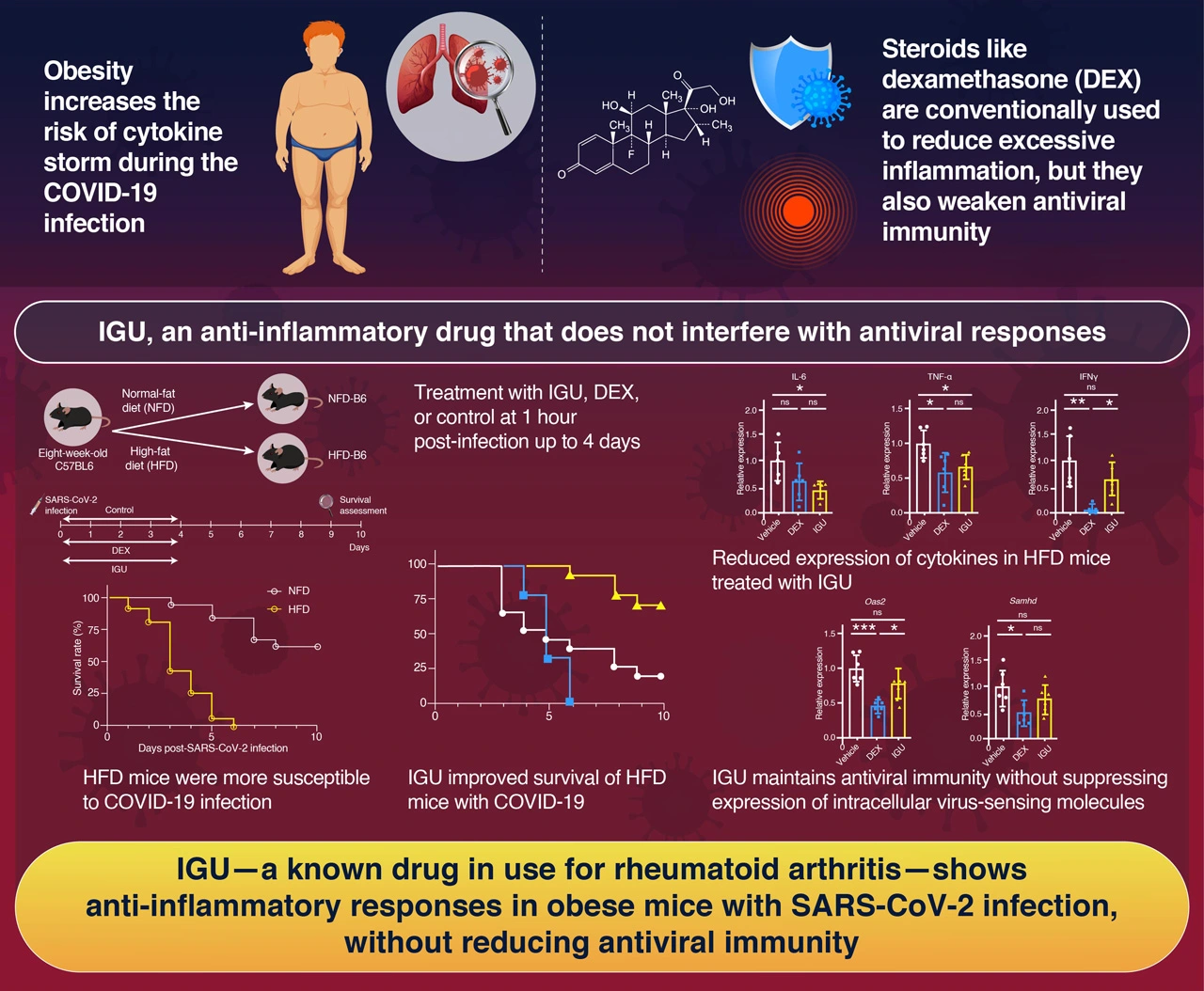A promising therapeutic agent for treating excessive inflammation due to COVID-19
Researchers show that iguratimod, a rheumatoid arthritis drug, reduces COVID-19-induced inflammation in mice without suppressing antiviral immunity
Using SARS-CoV-2-infected obese mice as model for cytokine storm seen in COVID-19, Institute of Science Tokyo researchers demonstrate efficacy of iguratimod in reducing excess inflammation without reducing antiviral immune response. Iguratimod significantly improved survival in these mouse models compared to when steroids like dexamethasone were administered. Conventional steroids reduce the inflammation while also suppressing immune responses against SARS-CoV-2, leading to reduced viral clearance from the lungs. Iguratimod presents a promising therapy for COVID-19-related inflammatory syndrome.
Iguratimod (IGU) Reduces Excessive Inflammation in Mouse Models of Severe COVID-19

Oba et al. (2025) | European Journal of Pharmacology | 10.1016/j.ejphar.2025.177537
The COVID-19 pandemic caused by SARS-CoV-2 infection is marked by excessive inflammation of several organs, leading to multi-organ failure. The recognition of the virus by our bodies triggers severe immune responses, causing a ‘cytokine storm,’ which can lead to acute lung injury and acute respiratory distress syndrome. Conventionally, glucocorticoids (GCs) are used to reduce cytokine storms caused by COVID-19. But GCs also suppress the antiviral immune responses of the body, delay viral clearance from the lungs, and worsen viral pneumonia in patients. Therefore, an anti-inflammatory therapy that does not suppress antiviral immune response is necessary.
To address this gap, a research team led by Professor Shinsuke Yasuda and Associate Professor Tadashi Hosoya, along with graduate student Seiya Oba, from the Department of Rheumatology, Graduate School of Medical and Dental Sciences at Institute of Science Tokyo (Science Tokyo), Japan, in collaboration with the National Institute of Infectious Diseases, explored the use of an anti-rheumatic drug—iguratimod (IGU)—in improving the survival of mice infected with SARS-CoV-2.
Obesity is one of the strongest risk factors for severe COVID-19. The research team has reported that visceral fat acts as a repository of inflammatory cells, making obesity a significant risk factor for COVID-19 in a previous study. Obese mice infected with SARS-CoV-2 exhibited a heightened risk of cytokine storm. Therefore, they decided to use SARS-CoV-2-infected obese mice as a model for cytokine storm in their current study. Their research was made available online on March 25, 2025, in the European Journal of Pharmacology and published on June 5, 2025, in Volume 996 on June 5, 2025
Eight-week-old male B6 mice were fed a high fat-diet (HFD) for ten weeks, following which they were injected with a sub-lethal dose of SARS-CoV-2. Drug treatments were administered to the mice 1 hour before virus inoculation up to 4 days after infection. Three days after infection, lungs were analyzed, or mice were monitored up to 10 days for recording survival rates. “We evaluated the efficacy of dexamethasone (DEX)—a clinically used anti-rheumatic drug, IGU, a proinflammatory response inhibitor, H-151, and a control, respectively, after administering them to HFD-B6 mice,” Yasuda explains the experimental treatment groups of their study. Mice treated with IGU showed higher survival rates than other treatment groups and demonstrated relatively mild inflammation and lung damage compared to the other groups. Hosoya further elaborates on their results, “We performed immunohistochemical staining of SARS-CoV-2 N antigen in the lungs 3 days after infection to understand whether IGU could suppress viral expansion in the lungs and found that the ratio of SARS-CoV-2 antigen-positive cells significantly decreased in the IGU group.”
The research team also showed that in mice administered with IGU, infection-induced genes that support antiviral immunity were not suppressed, unlike in those treated with DEX. They observed that DEX suppressed inflammatory responses in SARS-CoV-2-infected mice while simultaneously weakening antiviral immune responses, leading to reduced survival rates and poor prognosis in this group.
IGU is a safe drug already approved for use in treating rheumatoid arthritis. This study points towards its efficacy as an immunomodulatory drug for patients with severe COVID-19-related cytokine storm. With further clinical studies, IGU may be repositioned as a promising therapeutic agent for SARS-CoV-2 infections.
Reference
- Authors:
- Seiya Oba1,2, Tadashi Hosoya1,2*, Daisuke Kawata1,2, Yoji Komiya1,2, Hideyuki Iwai1,2, Ryuji Koike1, Sho Miyamoto2, Takayuki Kanno2, Akira Ainai2, Tadaki Suzuki2, Hideki Hasegawa3,4, and Shinsuke Yasuda1**
- Title:
- Iguratimod, a promising therapeutic agent for COVID-19 that attenuates excessive inflammation in mouse models
- Journal:
- European Journal of Pharmacology
- Affiliations:
- 1Department of Rheumatology, Graduate School of Medical and Dental Sciences, Institute of Science Tokyo, Japan
2Department of Pathology, National Institute of Infectious Diseases, Japan
3WHO Collaborating Centre for Reference and Research on Influenza, Japan
4Research Center for Influenza and Respiratory Virus, National Institute of Infectious Diseases, Japan
Related articles
Further Information
Associate Professor Tadashi Hosoya
Department of Rheumatology, Graduate School of Medical and Dental Sciences
- hosoya.rheu@tmd.ac.jp
Professor Shinsuke Yasuda
Department of Rheumatology, Graduate School of Medical and Dental Sciences
- syasuda.rheu@tmd.ac.jp
Contact
Public Relations Division, Institute of Science Tokyo
- Tel
- +81-3-5734-2975
- media@adm.isct.ac.jp